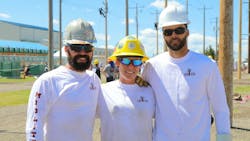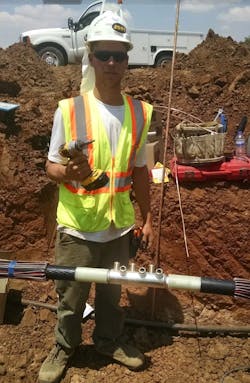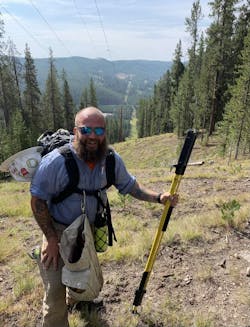In Canada, Rae-Lynn Hawco, a journeyman linewoman for Valard Construction, has worked in Alberta; British Columbia; the Yukon territory; Manitoba, Ontario; New Brunswick and Labrador. As part of the stringing fly (helicopter) crew, she enjoys traveling to new places, learning about different cultures and ways of work and meeting new people.
While it depends on the project, she often works 21 days on, seven days off on projects such as erecting transmission towers and wood pole H-frames to performing distribution work. Because she specializes in shift work, she travels with a group of workers who are on the same shift, but in different roles, and they stay in a camp-like setting in their free time. A catering company provides breakfast, packed lunches and suppers, and on-storm locals come to the staging area to make home-cooked meals for the lineworkers.
During her career, she has traveled to the United States for storm response with East Coast Powerline, based in Nova Scotia Canada. She responded to Hurricane Michael in 2018, Hurricane Henri and a storm in Detroit. Hurricane Ida in 2021, however, stands out in her mind as one of the most memorable.
“I have never worked a hurricane with that much devastation before,” she says. “It was hard work, but it was rewarding to help people who had been out of power for weeks or a month.”
In addition to working at Yellowstone, Block has also built and maintained the power grid for a gold mine in Nevada. “Our bucket trucks were tiny compared to their big rigs and dump trucks,” he says. “It was interesting to see them move the power lines to wherever the shovels were working.”
When he had the opportunity to move closer to home, he jumped at the opportunity to move to North Dakota in 2009 during the height of the oil boom. “I went from a town that was calm and mellow to North Dakota, where it was go, go, go and build as much as you can,” he says. “People were moving in there, and they wanted power.”
Block started doing callouts with journeymen linemen and seeing another side of the industry. “They were troubleshooting outages and working late hours compared to where I was mostly doing construction during the day,” he says. “That can open up a new chapter in your career, and you can see there’s more than just building power lines.”
Block, who lives with his wife, Sarah, and their three dogs in Montana, is stationed on the central coast of California for a project. After work, he can soak up the sunshine and swim in the ocean in his free time.
“I thought coming from South Dakota and Montana that California would be hot all the time, but where I’ve been right off the coast has been super cool,” he says. “I’m staying 20 minutes from the ocean, so I’m able to drive down there and hang out and take in the view.”
While he’s on the road, he uses the FurnishedFinder.com app to find places to stay away from home. The app was originally created for traveling nurses, but it’s now used for traveling workers and professionals. “I’ve found a few good places to stay where I can rent a room,” he says. “There’s kind of a family atmosphere because you’re renting from a family, and they’ve been super welcoming and comforting.”
During his travels and adventures, Block has met linemen from all over the country, and he has had the opportunity to learn from them and become a better lineman. One thing he discovered is that line work is not a universal language. “There are different names for different tools and systems,” he says. “You just need to ask questions if you’re not sure about something. You don’t chance it because you have a family, dogs or kids you want to go home to. With journeymen linemen, there’s no judgment, and they’re more than willing to help you because they don’t want you to make a mistake.”
Block, the son of a master plumber and electrician, says he loves the adventure of line work and being able to take in the scenery when working in remote areas like Yellowstone or the beauty of California. “When there’s no cell service, I think about how fortunate and lucky I am to be where I am,” he says. “I’ve been able to do everything from hanging out and having coffee with a buffalo to working near the ocean. I’m thankful for my dad giving me guidance to be a lineman. He knew I wanted to work outside and with my hands, and it’s been a great career choice.”
Block, who has helped to restore power following an ice storm in South Dakota and tornadoes in Minnesota, can’t imagine doing anything else for a career. He says he’s not sure where he’ll be living and working in five to 10 years, but one thing is for certain—he’ll still be in the line trade and passing on his knowledge to up-and-coming linemen.
“Throughout the years, when I’m rubber gloving in the heat or it’s just after a storm, and I’m exhausted, I think I should be in the office working next to an air conditioner or heater,” he says. “Then, I just kind of shake my head and say, ‘No way. This is what I’m meant to be doing. This is the struggle. The accomplishment at the end of the storm or the end of a job and the camaraderie with your fellow linemen—it’s what I was meant to do.”
Traveling Overseas
While many linemen travel from coast to coast, Parker Worth, a journeyman wireman, substation technician and host of the Shock Center Podcast, has had his share of adventures on the road. One of his favorite things about traveling for work is the camaraderie.
“You take a call and go to a job that is far from home, and you meet a bunch of random people from all over the country, and you all have the same purpose—wiring stuff up and doing installations,” he says. “There are always a bunch of characters and some wild people you wouldn’t normally meet, and you’re all working together. For me, I love that.”
He also enjoys the satisfaction of completing a job and looking back at all the hard work that has gone into it. In the early part of his career, he learned about wind turbine construction, but over the years, he’s worked on a lot of different projects. During his favorite job, he and his crew removed 500 kV transformers from a dam.
“The only way to get to one of those dams was via boat, and so we had to take a barge across the lake and disassemble the transformers, which were the size of tiny houses,” he says. “We had to de-energize them, ground them and disassemble them and basically use a crane and put them on a remote-control platform. They would then go down the hill, through the woods, onto a barge and across the lake, where we would load it on a truck. It was a lot of fun, and it was one of the most memorable jobs for me.”
While focusing on substation construction, he had an interesting encounter with snakes, which can slither under the fence and into nooks and crannies.
“One time I was on a project in Texas, and we were setting about 100 transformers on a project,” he says. “When they put the transformers down and prepared them for installation, a bunch of rattlesnakes crawled in. When we had to go test them for commissioning and place them on the pad, we would open it up, and there would be a 6-ft diamondback.”
During his decade in the trade, Worth has also worked in 20 different countries including Liberia, the Ivory Coast and the Congo in Africa, Indonesia and Cambodia in Asia; and Albania and Tunisia in Europe. He contracted with an American company and provided electrical services for U.S. embassies overseas. At that time, he was doing mostly electrical work from the fuse disconnect switch into the facilities.
“I had always wanted to work overseas because I love to travel,” he says. “One day I met a man who owned a company with a contract to do overseas work, and I knew that this was the opportunity. The next thing I knew I was on the road traveling and bouncing around.”
In many of the countries, there weren’t specialty equipment stores, so he needed to MacGyver it. “That’s where my skill set, at least with the tools, really improved drastically. You had to learn how to reuse things, use refurbished equipment and make everything look nice, new and up to code.”
He discovered that a lot of the concrete used in other countries has dirt in it, and as such, it is not as structurally sound. “We would try to mount electrical panels, and you would drill a hole and put your anchors in, and the concrete would completely crumble,” he says. “You would have to demolish the wall and use your own concrete that you mixed together and then let dry and then anchor it.”
He’s now based out of Marysville, Washington, which is north to Seattle, and he’s no longer doing overseas work, but he’s traveling throughout the Pacific Northwest for work. In fact, he’s on a new job every three to six months. “I’ve lived out of a hotel more than I’ve lived at my own house for the past 10 years,” he says. “And I think that is something people should know about what these guys do. In this trade, there’s a sacrifice of always being on the road, not knowing where you’re going to be the next week, being away from your family and working long hours. There’s a lot that goes into it.”
When traveling, he says it can be hard to find good food on the road, and he’s had his share of gas station burritos, especially in rural areas. He now follows a slow-carb diet, which he considers easy and cheap. Using this approach, he replaces starch-based carbs and replaces them with lentils or beans.
“Your body just rips through them and uses them as energy,” he says. “I always have cans of beans and lentils, and the guys always make fun of me, but it keeps me lean, energized and sharp. I try to make sure my diet is as good as possible and plan my meals and prepare them for the day, which has really helped.”
Beyond nutrition, he also advised other traveling workers to try to avoid alcohol whenever possible. “When you’re working out in the cold and the heat, it’s rough, and the first thing you want to do when you get home is to drink a beer,” he says. “If you have some problems with your life with traveling, and you are getting bad results, you may want to try to subtract that one thing. Then you will have more time to focus on other things.”
For those on the road, it can be hard to keep relationships going with family members and loved ones, he says. “A lot of guys spend a lot of time away from their families, and it’s hard to do,” he says. “I try to call everyone as much as I can. It’s nice to go out and chase the money, but is it better to support your family but you don’t see them or is it better to not have as much money and see your family more? It’s different for everybody.”
Amy Fischbach ([email protected]) is a field editor for T&D World magazine.
Editor’s Note: To learn more about the travelers in the trade, listen to the Line Life podcast by visiting www.tdworld.com/podcasts.
About the Author
Amy Fischbach
Electric Utilities Operations
Amy Fischbach is the Field Editor for T&D World magazine and manages the Electric Utility Operations section. She is the host of the Line Life Podcast, which celebrates the grit, courage and inspirational teamwork of the line trade. She also works on the annual Lineworker Supplement and the Vegetation Management Supplement as well as the Lineman Life and Lineman's Rodeo News enewsletters. Amy also covers events such as the Trees & Utilities conference and the International Lineman's Rodeo. She is the past president of the ASBPE Educational Foundation and ASBPE and earned her bachelor's and master's degrees in journalism from Kansas State University. She can be reached at [email protected].


